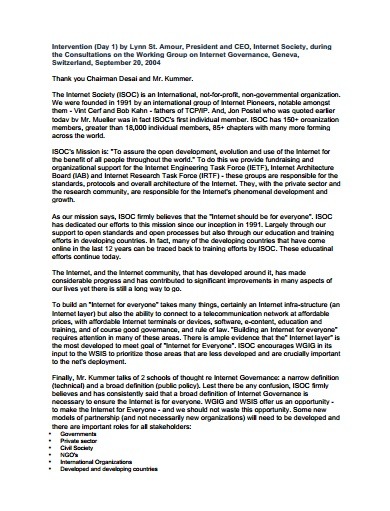Intervention (Day 1) by Lynn St. Amour, President and CEO, Internet Society, during the Consultations on the Working Group on Internet Governance
Geneva, Switzerland, September 20, 2004
Thank you Chairman Desai and Mr. Kummer.
The Internet Society (ISOC) is an International, not-for-profit, non-governmental organization. We were founded in 1991 by an international group of Internet Pioneers, notable amongst them – Vint Cerf and Bob Kahn – fathers of TCP/IP. And, Jon Postel who was quoted earlier today by Mr. Mueller was in fact ISOC’s first individual member. ISOC has 150+ organization members, greater than 18,000 individual members, 85+ chapters with many more forming across the world.
ISOC’s Mission is: “To assure the open development, evolution and use of the Internet for the benefit of all people throughout the world.” To do this we provide fundraising and organizational support for the Internet Engineering Task Force (IETF), Internet Architecture Board (IAB) and Internet Research Task Force (IRTF) – these groups are responsible for the standards, protocols and overall architecture of the Internet. They, with the private sector and the research community, are responsible for the Internet’s phenomenal development and growth.
As our mission says, ISOC firmly believes that the “Internet should be for everyone”. ISOC has dedicated our efforts to this mission since our inception in 1991. Largely through our support to open standards and open processes but also through our education and training efforts in developing countries. In fact, many of the developing countries that have come online in the last 12 years can be traced back to training efforts by ISOC. These educatinal efforts continue today. The Internet, and the Internet community, that has developed around it, has made considerable progress and has contributed to significant improvements in many aspects of our lives yet there is still a long way to go.
To build an “Internet for everyone” takes many things, certainly an Internet infra-structure (an Internet layer) but also the ability to connect to a telecommunication network at affordable prices, with affordable Internet terminals or devices, software, e-content, education and training, and of course good governance, and rule of law. “Building an Internet for everyone” requires attention in many of these areas. There is ample evidence that the” Internet layer” is the most developed to meet goal of “Internet for Everyone”. ISOC encourages WGIG in its input to the WSIS to prioritize those areas that are less developed and are crucially important to the net’s deployment.
Finally, Mr. Kummer talks of 2 schools of thought re Internet Governance: a narrow definition (technical) and a broad definition (public policy). Lest there be any confusion, ISOC firmly believes and has consistently said that a broad definition of Internet Governance is necessary to ensure the Internet is for everyone. WGIG and WSIS offer us an opportunity – to make the Internet for Everyone – and we should not waste this opportunity. Some new models of partnership (and not necessarily new organizations) will need to be developed and there are important roles for all stakeholders:
- Governments
- Private sector
- Civil Society
- NGO’s
- International Organizations
- Developed and developing countries
- And, today’s Internet bodies
As has been said many times the Internet is not a single entity — it requires coordination and the expertise of many from across the world.
As ISOC thinks about Internet Governance we make a distinction that may be helpful to WGIG as they go forward, that is to think about “Governing the uses of the Internet rather than the Internet itself”.
As I am on tomorrow’s panel, I will leave my comments on WGIG’s composition, structure and process until then.
Thank you.
